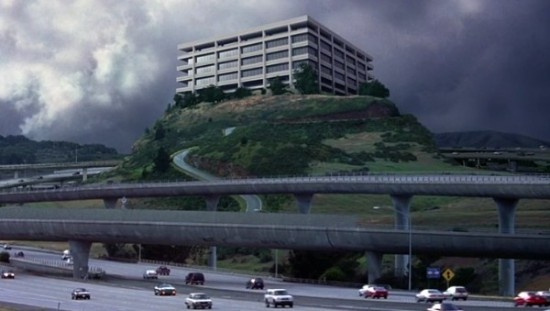Attn: Wage Slaves!
If I could go back in time to deliver a handful of ‘near future’ books to my 1987 self, Robert Wringham’s brilliantly entertaining new book, The Good Life for Wage Slaves, would probably be one of them.
The first review for The Good Life for Wage Slaves is in. Brian Dean, formerly of Anxiety Culture and now of News Frames, writes well of it. He also heads his review with a smashing quote from Robert Anton Wilson, embeds some great background to the anti-work movement, and ends with an excerpt from the book.
The review concludes with a chillingly accurate realisation of the office I describe in the memoir sections of my book. I thought at first that Brian had mocked it up in Photoshop but it actually comes from a 2001 film version of Bartleby the Scrivener. Amazing.

Read Brian’s review here and then, if you want to, buy the book.
Being Happy vs. Being Successful
Imagine reading a story titled “The Relentless Pursuit of Booze.” You would likely expect a depressing story about a person in a downward alcoholic spiral. Now imagine instead reading a story titled “The Relentless Pursuit of Success.” That would be an inspiring story, wouldn’t it?
Maybe—but maybe not. It might well be the story of someone whose never-ending quest for more and more success leaves them perpetually unsatisfied and incapable of happiness.
Hmm. I’d really and truly love to read a book called The Relentless Pursuit of Booze. I’m reading a history of absinthe at the moment which is frustratingly boring and humourless. I mean, how can you fuck that up?
But that aside, I agree with the thrust of this Atlantic article about “success addicts.” And thanks to reader Graeme for sending it in. It offers more than a glimpse into the psychology of workaholism. Dopamine hits aside, what they’re really seeking is distinction, and damn everything else.
The author of the piece confesses:
I once found myself confessing to a close friend, “I would prefer to be special than happy.” He asked why. “Anyone can do the things it takes to be happy—going on vacation with family, relaxing with friends … but not everyone can accomplish great things.” My friend scoffed at this, but I started asking other people in my circles and found that I wasn’t unusual. Many of them had made the success addict’s choice of specialness over happiness. They (and sometimes I) would put off ordinary delights of relaxation and time with loved ones until after this project, or that promotion, when finally it would be time to rest. But, of course, that day never seemed to arrive.
To this, I say: you’re already special, don’t worry about it. And if you really want to strive for something, it’s important that you define your own form of success instead of comparing yourself unimaginatively to others and thinking in terms of money or power. If nothing else, you’ll be better prepared should you ever need to make quickfire genie wishes.
Look for a quieter, private sort of success that won’t damage you or the people around you or the world, one that won’t violently slurp up resources like a tornado.
And remember this: the real horror of the pursuit of the conventional idea of success would be to actually achieve it. Nobody likes the dirt bags at the top. Imagine living at the top of the High Rise tower. I mean, what a loser. Imagine having a framed photograph of yourself shaking hands with Donald Trump. Even with politics aside, that’s really gross.
David Graeber: 1961-2020

Huge swathes of people, in Europe and North America in particular, spend their entire working lives performing tasks they believe to be unnecessary. The moral and spiritual damage that comes from this situation is profound. It is a scar across our collective soul.
Where Millions of Dreams are Crammed Together

From Guardian columnist Arwa Mahdawi:
Now that it is clear we can work anywhere, why would you live in a dirty, expensive city?
But, of course, people don’t come to cities for jobs alone; people come to places such as New York and London to be around other people. They come for the addictive energy that you get only in places where millions of dreams are crammed together. And many of us – misfits and minorities – stay in cities because they are the only places we feel we can be ourselves.
I must admit to similar thoughts. I love cities and I want to continue to live in one. I don’t like the spooky suburbs and the countryside, though I confess to a fondness for barn owls, just isn’t my bag. Efficient, well-run cities (high-density living) are probably the only way to accommodate our blossoming population numbers and the most important things in the world to me are culture and a sense that intelligent, kind, cosmopolitan people are nearby.
I have been wondering what to do, however, if culture never comes back. COVID-19 containment measures shutting everything down and stopping non-streamable cultural production combined with high rents pushing creative people out presents a problem. If I can’t go to art shows or small cinemas or jazz nights or coming-out parties or book launches, what’s the point of paying such a high rent?
What’s the point of lining our lungs with carcinogenic fumes if we don’t also get the advantages of being able to hobnob with other culture vultures or go for a midnight urban stroll or see a fringe play or visit a comedy club or see a big dinosaur skeleton in a Victorian public building or eat kimchi?
Dare I ask: is it time to escape the city and just get a tiny home and be done with rent forever?
I don’t think that time has come yet. I’m holding out hope that true city life will come back. Mahdawi’s column offers a ray of hope at least. If the super-rich would only bugger off (shite flight?) with their empty cashbox apartments and their obsessive condo-building and their tacky-ass musicals and their Silicon Valley-assisted grooming of a precariat, I think we natural city slickers would all be better off. Back, moneyed devil! Get ye back to yon superyacht!
I have a new book out. The Good Life for Wage Slaves. Available now in deluxe paperback and ebook.
Multimillion-Pound Sandwich Chain Needs Your Help!
This from Hettie O’Brien today is excellent. Absolutely first-rate. She rightly draws the connection between a right-wing message that we “get back to work” in city centre office blocks and the money that can be extracted from commuters and businesses alike:
The service economy in financialised city centres depends on the consumption patterns of office workers: commuting every day involves not just buying a sandwich or a coffee from Pret, but helping to prop up an entire system.
and
The people who seem most concerned about going back to work aren’t workers, or managers, but rentiers – a category that applies to many retiree readers of the Daily Mail and the Telegraph, a demographic that is likely to have paid off mortgages, receives generous pensions and contains a higher proportion of private landlords, and to the rentiers.
The quotes she pulls from those right-wing media outlets are quick shocking too. Read it up.
When newspapers shriek that workers must return to the office, despite the reality that many don’t want to, they’re voicing what the sociologist Luc Boltanski called a “system of confirmation” – an utterance that is neither truth nor fact, but rather a way of reinforcing the status quo. But nobody can think that risking their health to save a multimillion pound sandwich chain is a sensible endeavour.
An Escapologist’s Diary: Part 62. Hole.

Escape Towers is on the top floor of a very old building, and water drips into our spare room whenever there’s serious rain. We reported the problem to the landlord some time ago, but no repairs were forthcoming. Since it was only our spare room and wasn’t a constant problem, we didn’t put any pressure on him to get it fixed. Bohemia!
Read the rest of this entry »



